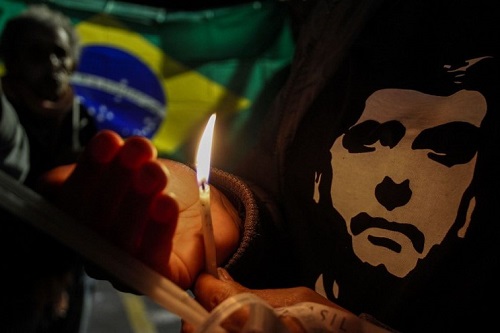AFP photo
By
Tom Arms
There is a new, clearly defined road to political power—become an anti-politician.
Forget about compromise, consensus and appealing to the middle ground. Dismiss ideas of party loyalty. Discard thoughts of reasoned political debate.
No, today’s successful politician is a crude, crass, socially unacceptable bully pandering to the basest human instincts to gain power. Finally, today’s successful candidate must be outside the traditional political establishment.
You may think that the previous is the start of yet another diatribe against President Donald Trump. In a way you are right. Trump is the international benchmark. He has lit the torch down this dark and dangerous path. But others are following. The latest addition to this pantheon of horror is Brazil’s Jair Bolsonaro.
Brazil is important. It is Latin America’s largest country, with a population of 207.7 million. It has the eighth largest economy in the world. And, it is resource rich with more potential than an infant Amadeus Mozart.
On October 5th Brazilians troop to the polls for first round presidential elections. The run-off between the top two from round one will be held on 25 October. At the moment there are nine candidates. 63-year-old Bolsonaro is 40 percent ahead of his nearest rival.
His commanding lead is partly due to the fact that Bolsonaro is laid up in a hospital bed recovering from a knife attack which provided him with the additional aura of political martyrdom. But even before he was stabbed on the 6th of September Jair Bolsonaro was streets ahead of his political opponents,
To secure pole position, Bolsonaro has out-trumped Trump. On the subject of misogyny, the Brazilian has said he would not rape a certain congresswoman because she was “too ugly.” His daughter, said Bolsonaro, was conceived in a “moment of weakness”; maternity pay should be scrapped and women should be paid less because of pregnancies.
Bolsonaro is strongly opposed to gay rights. He has said that he would rather his son dead than gay. He advocates widespread gun ownership, the re-introduction of capital punishment, opposes abortion, same sex marriage, land reform and drug liberalisation. He thinks torture is a great idea and plans to beef up the military and police.
An evangelical Christian, he has cornered the Christian right political market which is estimated to be 29 percent of Brazil’s voters. Bolsonaro’s campaign slogan neatly combines a populist nationalism with religious fervour. It is: “Brazil Above Everything, God Above Everyone.”
Perhaps most worrying is Bolsonaro’s views on the military. He was an officer for 17 years before entering the political arena in 1988. He has described the military dictatorship that ran the country from 1964 to 1988 as “a glorious period that led to 20 years of order and progress.” The same dictatorship—according to Human Rights Watch—locked up 50,000 political opponents, tortured 2,000 and forced 10,000 into exile.
Bolsonaro—not surprisingly– is loved by the military but reviled by the traditional Brazilian political establishment. In 25 years in the national congress he has been in four different political parties and proposed 173 bills. None of them have passed because, as Bolsonaro admits, you have to be liked and prepared to compromise to succeed parliament.
So why is the Brazilian public turning to Bolsonaro? Why are populists of the extreme left and right rapidly rising? Because traditional politics are perceived to have failed. The world has yet to recover from the crash of 2008-2009 which is seen as the fault of and unholy alliance of bankers and self-serving politcos. The economy has shrunk by ten percent and unemployment is at 12 percent.
Voters around the world want to drain the swamp of self-serving politicians. But in response they are turning to the animals of the dark and dangerous forest.
Tom Arms
I am a journalist, entrepreneur and historian with extensive experience in print, web and broadcast journalism. I started as a diplomatic correspondent, wrote several books (The Falklands Crisis, World Elections On File and the Encyclopedia of the Cold War), and then in 1987 started my own business (Future Events News Service, www.fensinformation.com) which over 25 years established itself as the world and UK media’s diary. Our strapline was: “We set the world’s news agenda.” I sold FENS in December 2012 but retained the exclusive broadcast rights to all of FENS data. To exploit these rights I set up LookAhead TV which produces unique programmes which “Broadcasts Tomorrow Today” so that viewers can “Plan to Participate.” LookAhead has appeared regularly on Vox Africa, Radio Tatras International, The Conversation and Voice of Africa Radio.
In addition to being a syndicated broadcaster and columnist on global affairs, Tom is also available for speaking engagements and can be contacted on Twitter, Linkedin and email: [email protected].



No Comments Yet!
You can be first to comment this post!